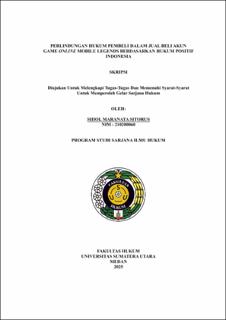| dc.description.abstract | The practice of trading Mobile Legends online game accounts in Indonesia has evolved into a common habit among gamers, despite the absence of explicit legal regulations under Indonesian law. This study specifically analyzes the validity of Mobile Legends account sale contracts based on the provisions of Article 1320 of the Indonesian Civil Code, evaluates the effectiveness of legal enforcement mechanisms for transactional violations in accordance with both the Civil Code and the Law on Electronic Information and Transactions, and identifies the available legal protection mechanisms that buyers can access to mitigate the risks of losing control over their accounts (hackback) and falling victim to digital fraud.
This research employs a normative juridical method, relying on secondary data such as statutory regulations, legal doctrines, and relevant case studies. The analysis is conducted qualitatively by evaluating the validity of agreements based on the four essential elements outlined in Article 1320 of the Indonesian Civil Code: mutual consent, legal competence, a specific subject matter, and a lawful cause.
The findings reveal that the sale of a Mobile Legends account qualifies as a legally valid agreement if all legal conditions are fulfilled, even though the object is digital and intangible. In practice, however, such transactions are vulnerable to fraud and lack optimal legal protection. This is due to the absence of explicit legal provisions recognizing digital goods as legitimate contractual objects and the weak regulatory oversight of digital transactions. Consumer protection mechanisms are currently limited to civil claims for breach of contract or criminal complaints under the ITE Law. | en_US |


